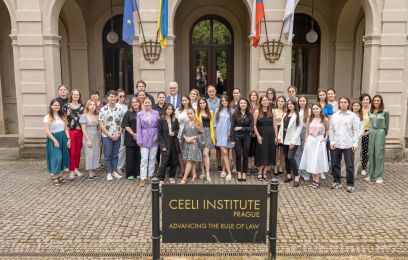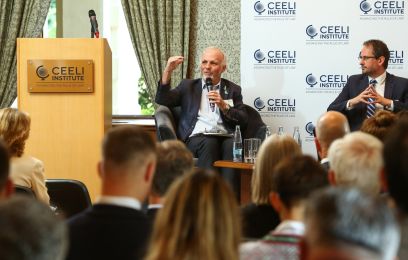
After Russia’s full-scale invasion of Ukraine in February 2022, officials in Kyiv and their allies around the world began working to find and seize Russian assets targeted by sanctions. The reason is simple: With the World Bank estimating that the cost of reconstruction will exceed $411 billion, assets seized will be used to help Ukraine rebuild.
In the U.S., the KleptoCapture task force was launched in March 2022 to enforce sanctions on Russian oligarchs and find their hidden assets around the world. Meanwhile, to enhance EU sanctions enforcement, the European Commission established a “Freeze and Seize” Task Force to ensure coordination among member states and EU agencies.
But despite strong cross-border support, finding, freezing, and seizing Russian assets outside of Ukraine poses legal and logistical challenges. Navigating those obstacles was the topic of a Czech-Ukrainian bilateral conference on August 29-30, 2023, in Prague, organized by the CEELI Institute in partnership with the Ukrainian think-tank, the Institute of Legislative Ideas.
“Financial sanctions are a good instrument in the pursuit of justice”, said Kateryna Shyroka, a judge on the High Anti-Corruption Court of Ukraine and a conference panelist. “[And] speed is very important to show that it’s easy to seize assets and use the money to rebuild Ukraine.”
The two days of discussions brought together experts involved in the application of sanctions, including Ukraine’s deputy ministers of justice and foreign affairs, judges with the country’s high anti-corruption court, and deputy prosecutor generals, along with their Czech counterparts. International experts, including from the EU Task Force, also participated.
There is a “brutal war on the European continent, near our borders,” said Ivo Pospíšil, Presiding Judge of the Chamber, Czech Supreme Administrative Court, on a panel focusing on tracing and freezing assets. But in prosecuting war crimes and seizing assets, “We must respect fundamental rights standards, with all the guarantees of individual rights.” The lack of harmonization between legislations in different countries can indeed lead to potential violations of fundamental rights and freedoms.
Přemysl Polák, deputy to the Czech Supreme Public Prosecutor, explained how difficult the process of freezing assets in the framework of mutual legal assistance in criminal matters is. “Assistance can be provided only within the limits of legal regulation, which is complex, as there are many rights to be protected”, he said. The Czech judicial authorities deal with two main issues when reviewing Ukrainian requests for freezing of assets: double criminality—the conduct should be punishable under the law of both states—and a genuine link between the criminal case or the perpetrator on one hand, and the assets on the other hand.
Czech Deputy Minister of Justice Karel Dvořák discussed how collecting evidence while preserving individual rights is among the biggest challenges in prosecuting cross-border sanctions cases. “We need to respect our constitution and human rights, not only at the Czech national level but [also] at the European Level,” Dvořák said.
A key concern for European policymakers is preventing the movement of Russian assets from one EU member state to another. New EU legislation, initiated during the Czech presidency of the EU council last year, was written to address this.
“It’s crucial to have a common legal basis that defines sanctions and explains what circumvention looks like,” said Zuzana Fišerová, director general for international and European cooperation at the Czech Ministry of Justice. “The new EU legislation aims to prevent individuals and legal entities from hiding properties in different countries in the EU. From the justice perspective, this is one of the biggest achievements of the Czech presidency.”
Sharing legal advice and experience was the top goal of the sanctions-related conference. “CEELI managed to organize a very efficient communication platform, where representatives from many countries have a chance to meet and communicate their opinions and information,” said Deputy Head of Ukraine’s Security Service Serhiy Naumiuk, a speaker in a panel on challenges of identifying grounds for imposing individual sanctions. “As a result, we [Ukraine] can answer more effectively to the challenges facing us.”
After the August conference, Dmytro Verbytskyy, the deputy prosecutor general of Ukraine, met with the Czech prosecutor general, Igor Stříž, and his deputy, Přemysl Polák. Their agenda included mutual legal assistance and strategies for speeding up joint investigations.
The CEELI Institute has supported Ukraine’s fight for justice and accountability since the beginning of the war. Last October, after a CEELI Institute program on non-criminal forfeiture of assets of sanctioned individuals, the Ukrainian Parliament introduced criminal liability for sanction evasion, simplifying the process of confiscating assets.
The Institute will continue its close cooperation with Ukraine, offering sophisticated training and opportunities to connect legal experts and improve domestic and international cooperation.
Interviews recorded on August 29-30, 2023, at the CEELI Institute, with simultaneous interpretation for Mr. Dmytro Verbytskyy and Mr. Serhiy Naumiuk.


